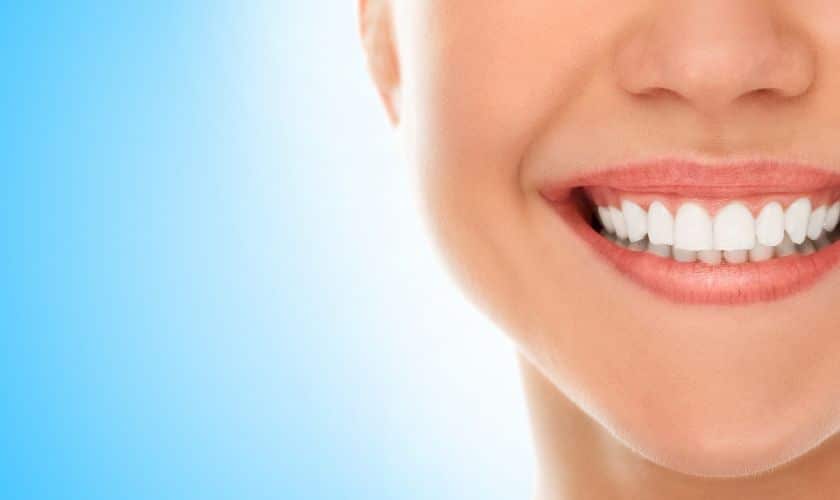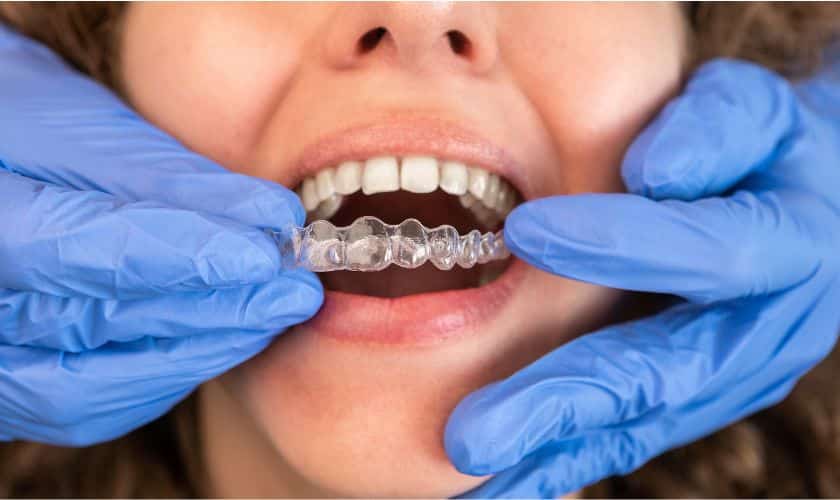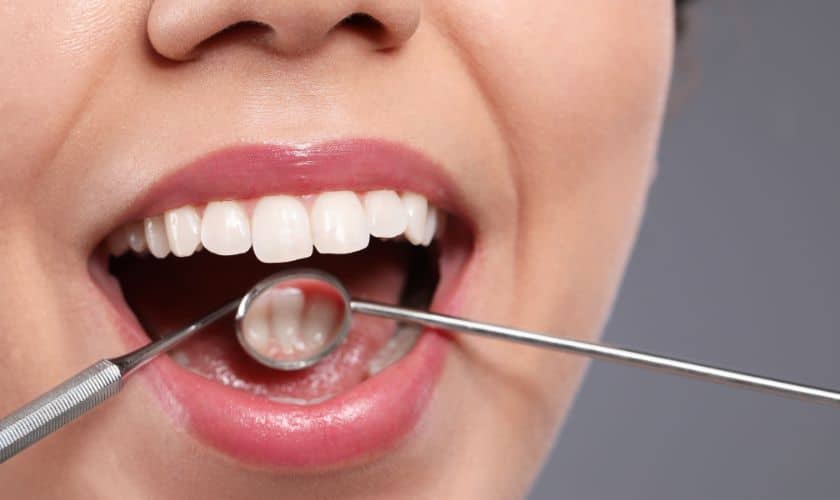Impact Of Teeth Whitening On Your Oral Health
May 4, 2023
Teeth Whitening

A bright and healthy smile is something that everyone desires, but over time, our teeth can become discolored due to various factors. This is where teeth whitening comes in as a popular solution to restore the natural whiteness of your pearly whites. However, while getting rid of those stubborn stains may seem like a quick fix for achieving a Hollywood-worthy smile, it’s important to consider the impact it has on your oral health. In this blog post, we’ll explore everything you need to know about teeth whitening and how it affects your dental well-being. So sit back, grab some floss, and let’s dive in!
What is teeth whitening?
Teeth whitening is a dental procedure that aims to brighten the color of your teeth. It’s a cosmetic treatment that removes stains and discoloration from the surface of your teeth, making them appear whiter and brighter.
There are various factors that can cause tooth darkening or staining, such as smoking, drinking coffee or tea excessively, poor oral hygiene habits, aging, certain medications like antibiotics, and genetics. Teeth whitening treatments help restore the natural shade of your teeth by using bleaching agents to break down stains on the enamel.
Teeth whitening can be done in-office by a dentist or at home with over-the-counter products like strips, gels, or trays. In-office treatments typically involve stronger concentrations of the bleach than at-home kits but may require multiple sessions for optimal results.
It’s important to note that not everyone is eligible for teeth whitening procedures due to underlying dental issues such as cavities or gum disease. Prior consultation with a dentist is therefore necessary before undergoing any form of treatment.
The different types of teeth whitening products
There are several types of teeth whitening products available in the market, each with its own unique features and benefits. One popular option is over-the-counter whitening strips, which contain a low concentration of bleaching agents that you apply directly to your teeth. These strips are easy to use and can produce noticeable results after just a few uses.
Another type of product is whitening toothpaste, which contains mild abrasives that help remove surface stains from your teeth. While this may not be as effective at removing deeper stains as other methods, it can be a good option for maintaining your dental hygiene and keeping your smile looking bright.
Professional-grade at-home kits are another option for those who want more intense results without having to visit the dentist’s office. These kits usually include customized trays that fit snugly over your teeth and contain high-concentration bleaching agents. They can be more expensive than over-the-counter options but offer better results.
In-office treatments performed by dentists also provide fast and dramatic results using stronger bleaching gels or lasers to whiten teeth quickly. However, these treatments tend to be more expensive than at-home options.
Ultimately, when choosing a teeth-whitening product or treatment method, it’s important to consider both cost-effectiveness and potential side effects such as sensitivity or damage to enamel; therefore consulting with a professional may always bring great value into consideration prior to making any decision on which type of product would work best for an individual’s specific needs depending on their oral health condition
The pros and cons of teeth whitening
Teeth whitening has become increasingly popular in recent years, with many people seeking to improve their smile and boost their confidence. However, while there are certainly benefits to teeth whitening, there are also some potential drawbacks that should be considered.
One of the biggest advantages of teeth whitening is that it can dramatically improve the appearance of your smile. A brighter, whiter set of teeth can make you look more youthful and attractive, as well as give you a newfound sense of confidence.
On the other hand, one potential downside is that some types of teeth whitening treatments can cause sensitivity or discomfort. This is because they may remove some enamel from your teeth in order to achieve a whiter shade. It’s important to speak with your dentist about any concerns you have before undergoing treatment.
Another disadvantage is that teeth whitening treatments may not last forever – especially if you continue consuming foods or drinks that stain your teeth like coffee or red wine. Additionally, overuse or misuse of certain products could lead to damage such as gum irritation or even chemical burns.
Ultimately, whether or not teeth whitening is right for you will depend on your individual needs and preferences. If done safely and correctly, it can be an effective way to enhance the look of your smile – but it’s important to weigh both the pros and cons before making a decision.
How to safely whiten your teeth
When it comes to teeth whitening, safety should always be your top priority. While it’s true that some products can deliver fast and dramatic results, they may also come with potential risks and side effects. To safely whiten your teeth, here are a few tips you should keep in mind:
1. Consult with your dentist first – Before trying any new teeth whitening product or procedure, make sure to consult with your dentist first. They can evaluate the health of your mouth and recommend the best option for you.
2. Stick to reputable brands – When shopping for at-home teeth whitening kits or products, only buy from reputable brands that have been tested and approved by dental professionals.
3. Follow instructions carefully – Whether you’re using an over-the-counter kit or getting professional treatment at a dental clinic, always follow the instructions carefully to avoid damaging your enamel or gums.
4. Avoid overuse – Whitening too often or for too long can lead to sensitivity, pain, and even damage to tooth enamel. Be sure to follow recommended usage guidelines closely.
5. Opt for natural remedies when possible – If you prefer a more natural approach to teeth whitening, try incorporating foods like strawberries or baking soda into your oral care routine instead of harsh chemicals.
Remember: while bright white teeth might be tempting, prioritizing safety is key when it comes to maintaining good oral health!
Summary
To sum it up, teeth whitening is a popular cosmetic dental procedure that can have both positive and negative effects on your oral health. While it can give you a brighter smile and boost your confidence, overuse of harsh chemicals or improper techniques can cause damage to your teeth and gums.
Therefore, before going for any teeth whitening treatment, consult with your dentist first to determine the best option for you based on the condition of your teeth. And always follow safe practices such as using products approved by dental associations or seeking professional help from licensed dentists.
Remember that good oral hygiene habits such as brushing twice daily, flossing regularly, and reducing intake of foods and drinks that stain the teeth are also important factors in maintaining white healthy-looking teeth.
By keeping these tips in mind, you’ll be able to enjoy all the benefits of having whiter teeth without compromising your overall oral health!
Recent Post

How Soon Can I Work After Getting a Root Canal?

Oils That Can Help To Reduce Gum Inflammation

The Gift of Oral Health: Dental Treatments for Moms this Mother’s Day

Maintaining Oral Health While Using Invisalign in Robstown: Tips and Tricks

